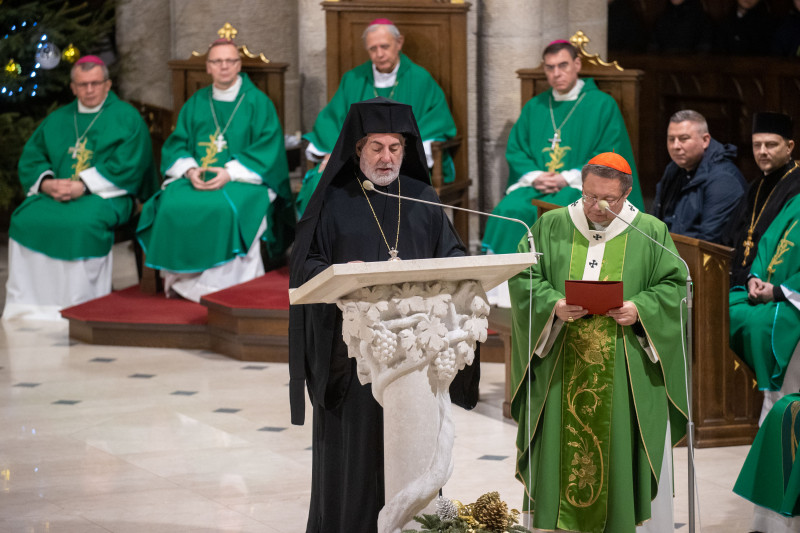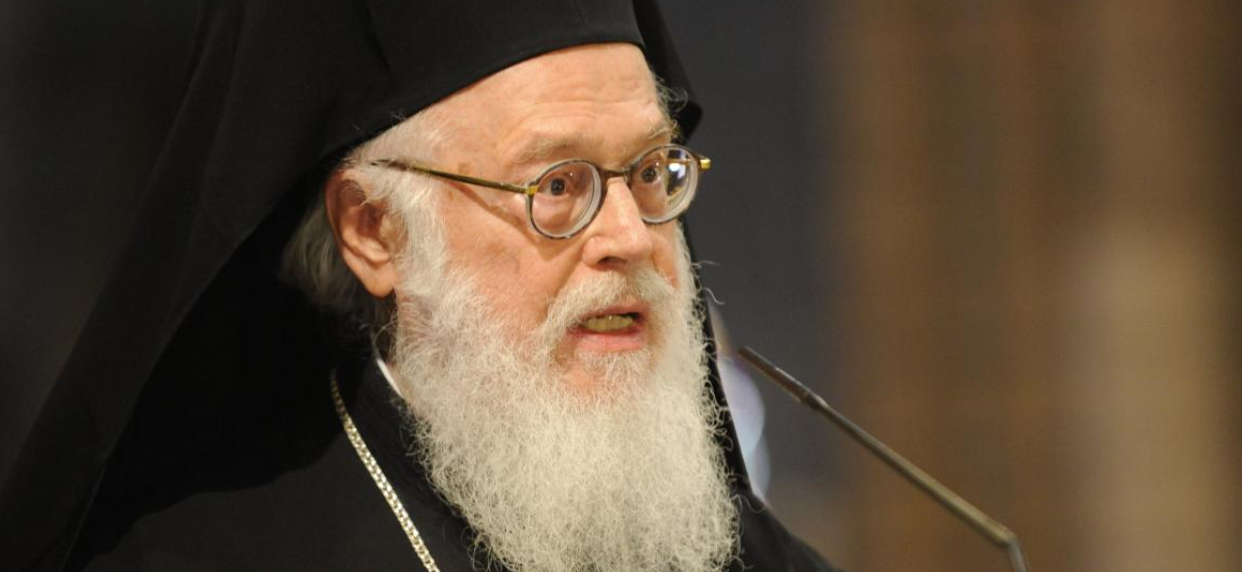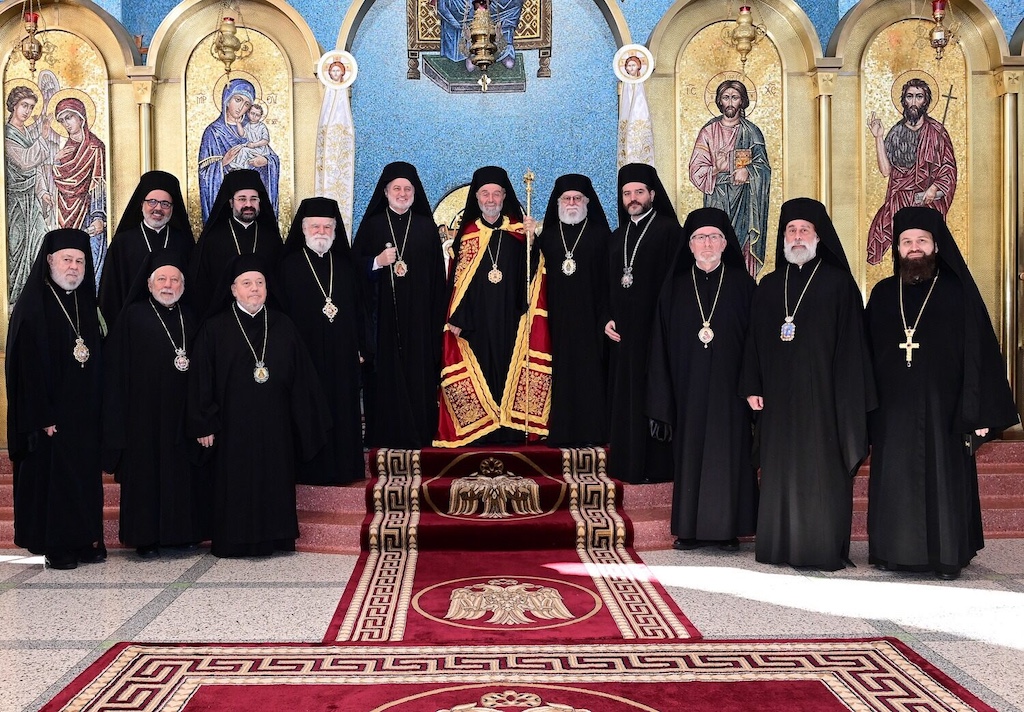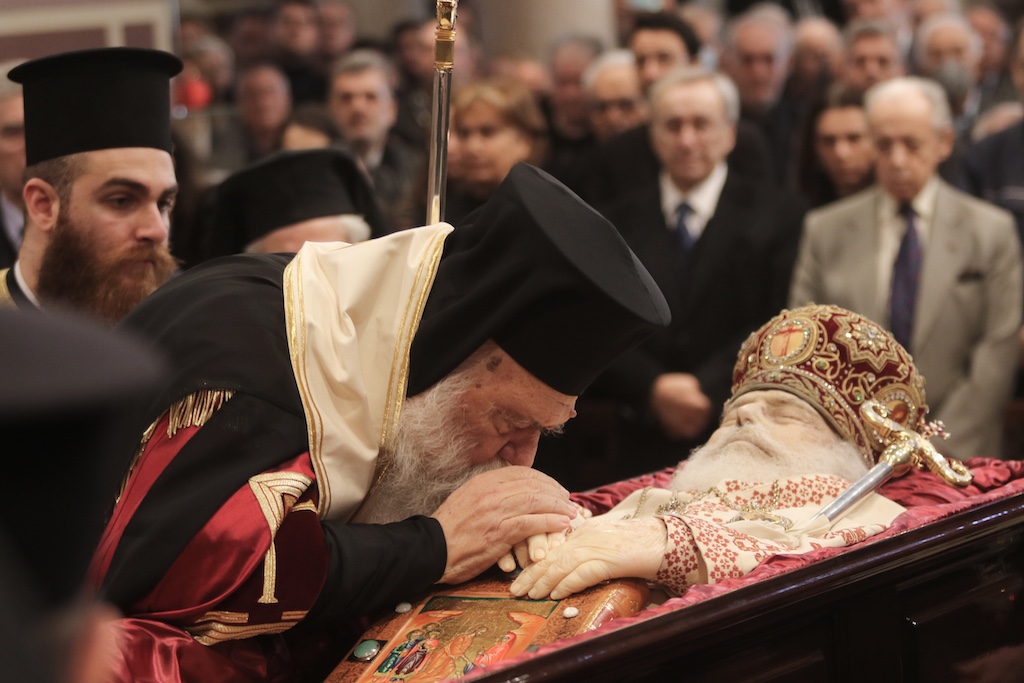On the Birth of Our Most Holy Lady, the Mother of God


Today, the Virgin Mother is born from a barren mother and the palace is bedecked for the coming of the Lord Christ. Today, the bonds of sterility are broken and the gates of the Virgin are barred. Because, as the barren womb was dead for the purposes of child-bearing and yet, against all hope, brought forth a wonderful fruit, so, by the same token, incorruptible virginity is pledged and the miracle of birth-giving is heralded with works obvious to all. Because child-bearing without the intervention of a man is a supernatural miracle, as is the preservation of virginity after birth. Another person who overcomes the laws of nature is the barren woman who conceives in her old age and gives birth.
And with all the miraculous events that take place, presages the birth of the Virgin. Today Anna reaps the fruit which came from the reproach of childlessness and the whole world enjoys the fruit-laden stems of joy. Ioakeim is named as the father of the child, as we receive the honour of adoption as a pledge… The Virgin comes from a barren womb, though even had it been fertile the birth would still have been remarkable. Such a great miracle. When the time for sowing had gone, that’s when the harvest came; when the flame of desire had been extinguished, that’s when the taper of child-bearing was lighted. Youth did not bring a flower, but old age sent forth a shoot. The belly didn’t swell when nature was at its peak, but an ever-virgin infant appears as the offspring of an elderly womb.
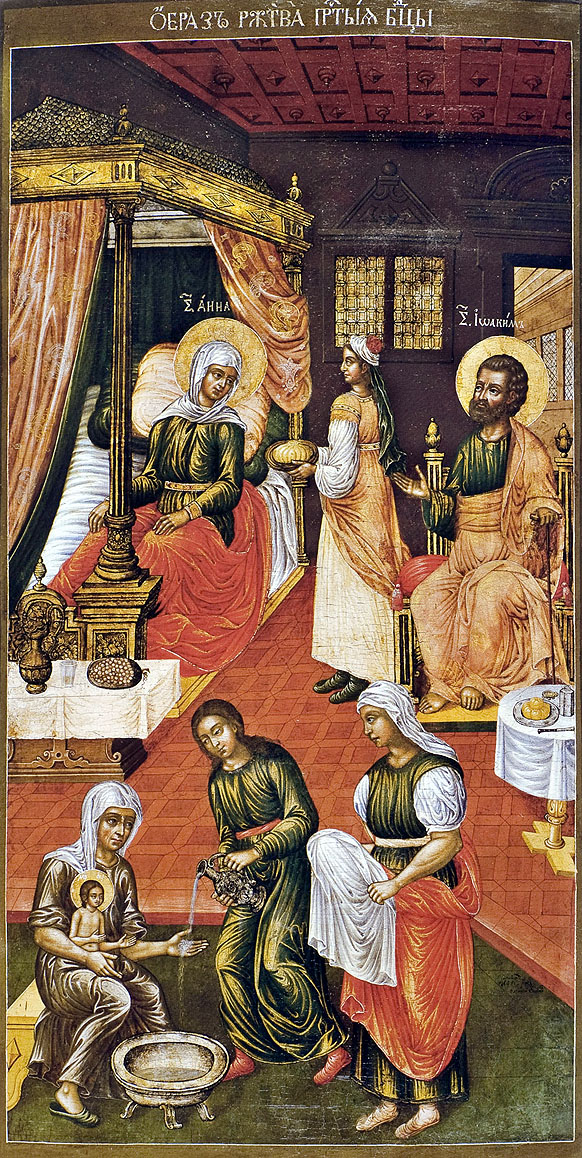

The Birth of the Mother of God, Russian Icon, 18th Century
But people wonder at a barren woman giving birth. They want to investigate in detail what they should simply be marvelling at, and get into arguments over what happened. If she’s barren, she can’t give birth; and if she gives birth, she isn’t barren. And how do breasts that are dry become a source of milk? If it’s not in the nature of old age to store blood, how did the breasts make into milk that which they didn’t have? And how does a womb that’s become inert function and give life to, form and feed the embryo? These are no more than stumbling-blocks for yourself and your salvation. And who are you, in any case? Why can’t you be among the believers who are worthy of the miracle? Did Sarah not see Isaac, the son of her old age and barrenness? If Anna upsets you and troubles your thoughts, how much more so should Sarah, because she was the first it happened to. If these things make you doubt, don’t you realize that you’re writing off other people from kinship with you; you’re cutting the roots from which you might be a branch…
From olden times, then, even though human nature was in thrall to the power of the ancestral sins, child-bearing on the part of those who were barren has heralded that fact that He Who destroys them [the sins] will bring it [human nature] out of servitude and free it from tyranny. This is why, when they had been cleansed of the grime of their transgression and had rejected despondency and gloominess, Adam and Eve, with free voices and looks, are present in joy at the festival of the Virgin and probably have become the leaders of the dance. Because it is fitting that they, from whom came the seed of sin which grew like a parasite and infested the human race, should be at the forefront of the rejoicing, now that it has been uprooted…
In other words, because the sickness of the transgression was transmitted to everyone else by the first perpetrators and we all have the need for the same cure, and since today the foundations of universal salvation are laid with the birth of the Virgin, we should organize a common and all-embracing festival, in order to sing public and heavenly hymns of praise. Because the universality of salvation demands celestial thanksgiving.
Let us therefore send up hymns of thanksgiving, since Adam is recreated and Eve is renewed. Together with this, the curse is lifted and our human nature, casting off the dead skin of the mask of sin, takes back the form of its ancient honour of the image of the Lord. Let us send up hymns of thanksgiving and gather, all together, as one, because with the coming of the Virgin from a barren womb, the barrenness of nature is sanctified, its fruitlessness has had grafted onto it the rich fertility of the virtues… The ladder which ascends into the heavens has been constructed and earthly nature, exceeding its bounds, resides in the celestial dwelling-places. The Lord’s throne is prepared upon the earth, earthly things are sanctified, the legions of the heavens mingle with us and the Evil One, who, in the beginning deceived us and became the instigator of the plot against us, is hoist with his own petard.


Who can tell of the wondrous works of God? What words can express the power of things which are beyond words? And how would any mind not freeze, trying to understand the magnitude of the works. In the first place, God made people because He was motivated by an incommunicable abundance of love for us, giving the created being the grace to bear the power and the image of its Creator, in the nobility both of the flesh and of the spirit. Paradise, a thing most pleasant and beloved, was planted in the East, all fragrant with the flowers of the meadows and indeed full to overflowing with attractive and varied fruit from trees.
There were also rivers flowing through it, irrigating the grounds with pure water and lending an improbably fine beauty to the place. It was in this place that the Creator placed the artefact of His hands, making him lord over all and surrounding him with all manner of good things. He later gave him a wife, having first taken a rib from his side to perform the inexpressible vivication in such a way that the woman would recognize her donor as the head [of the family] and would be devoted to him and would keep in mind her obligation to create between them a link of harmony as well as the link of nature.
But once He had granted the usufruct and overlordship of all things in Paradise, He had to train the people he had entrusted with such great authority. He gave them a law, which was neither difficult to observe, nor extremely easy to keep in its totality. Through this they would gain either their reward or their condemnation. So He set aside one plant among all those which were flourishing there and issued the commandment that it was forbidden to eat of this one alone. But an evil beast and the principal of wickedness, using as his tool a serpent and directing towards the woman seductive and attractive words and casting all kinds of blasphemies at the Creator, convinced the woman- and, through her, her husband- to ignore the commandment and to eat of the fruit that they had been told to avoid. They did so, and, in that moment, broke the commandment and lost all the gifts, which is exactly what the Evil One had plotted for. This is what the entire intrigue had been aimed at. Thereafter, by transmitting the lapse from ancestors to descendants, the plotter had the whole of the human race in thrall to his authority.
So what did our Creator and Guardian do? Did He leave His creation to be tormented for ever, to be a slave of the passions? Of course not. How could He bear to see what He had made from an abundance of love made a prisoner and living in delusion. This is why, when the unity of the Holy Trinity had convened with Itself (if I may be permitted to express myself thus), It arranged, through Its uniform will, that the creature which had been devastated should be remade (we ought to talk of “remaking” because “Let us make people in our image and likeness” had been said of the original creation). But because people had become so barbaric and had sunk to such depths that they would not return, irrespective of threats, punishments or [the words of the] prophets, God required a person who would have our own nature, one in whom He could see the law being observed to the letter, so that people could compare this with the actions of others and so that the plotter against us might be cast down from his domination over us by a legitimate struggle and victory.
So one of the persons of the Trinity had to descend, to be among people so that the new creation could show forth the true character of our original nature. And He would have to become a Son here and not dishonour His office above, which He had held for ever and was glorified for. But He could not come into the midst of the sons of Man without an incarnation. Because incarnation is the way to birth and birth is the culmination of pregnancy. And this naturally required prior preparation. A mother had to be prepared here on earth for the Creator and for the recreation of those who had been devastated. She would have to be a virgin, so that, just as the first person was made from virgin soil, the recreation would occur through a virgin womb, without the involvement of any sensual pleasure. Because the people whom the Lord wished to liberate, by consenting to be born, were enslaved to sensual pleasures.
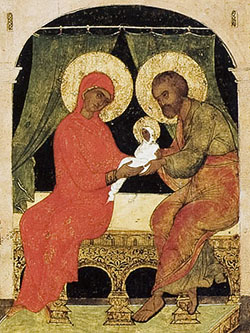

But who was worthy to become the servant of the mystery. Who was worthy to become the Mother of God and lend flesh to Him Who enriches the universe. Who was worthy? Clearly, she who today has budded in a strange manner from the barren root of Ioakeim and Anna; she whose luminous birth we celebrate and whose advent marks the beginning of the miracle of the greatest mystery, I mean the incarnate birth of the Saviour; she for whom this divine and all-embracing assembly has been called. Because it was right and proper that she who had preserved her body in purity from her early infancy and maintained her soul and thoughts in purity should have been destined to be the mother of the Creator. It was right and proper that she who as a young child was offered to the temple and entered rooms untrodden should be the animate temple of Him Who gave her her soul.
It was right and proper that she who was born of a barren mother in a strange manner and who expunged the reproach of her parents should also undo the error of our first ancestors. Because the descendant was destined to reverse the ancestral defeat by giving birth, without a man, to the Saviour of the human race and giving Him a body. It was right and proper that she who with the beauty of her soul adorned the beauty of her form, should appear as a distinctive bride who would be fitting for the heavenly Bridegroom. It was right and proper that she, whose virtues shone like the stars, should make herself like the heavens, causing the dawn of the Sun of Righteousness to become known to one and all. It was right and proper that she, who once tinged herself with the purple of her virgin blood, should become the royal robes of the King of All.
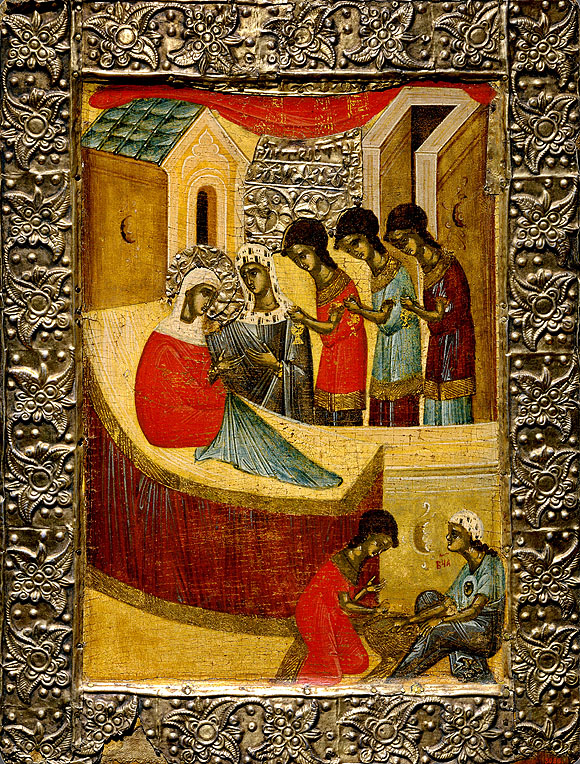

The Birth of the Mother of God, Russian Icon, 15th Century, Tver
What a miracle! He Whom the whole of nature cannot contain fits comfortably into a virgin womb. He, on Whom Cherubim and Seraphim do not dare to gaze, is cuddled in the lap of the Virgin, held by her arms of clay. From the arid and barren womb comes the holy mount [the Virgin], from which, once the precious corner-stone, Christ our God, had been miraculously hewn, He destroyed the temples of the demons and the kingdom of Hell along with the tyrannical dominion itself. The animate and heavenly oven was prepared on earth and in it any weeds were burnt before the pure dough was inserted by God to make bread for Himself. But what can anyone say about the multitude of gifts and achievements of the Virgin? We are diffident and joyful, calm and excited. And then again, we lose our voice and find it, shrink and expand, motivated, on the one hand by fear and on the other by desire…
But you, Virgin and Mother of the Word, our atonement and refuge, who in wondrous wise were nurtured by a barren woman and who bore for us, even more strangely, the ear of wheat Who gives life, pray and intercede with your Son and our God for us, who hymn you, that we may be cleansed from the stain of all pollution. Make us worthy of the heavenly bridal chamber where we shall enjoy eternal rest, brightly illumined by the triple light of the supra-essential Trinity and lose ourselves in the mystical and ineffable sights, through the grace of Jesus Christ our Lord, to Whom belong glory and power unto the ages of ages. Amen.
Source: Saint Fotios the Great, Patriarch of Constantinople, Homily 9, On the Birth of the Our All-Holy Lady, the Mother of God (excerpts).


